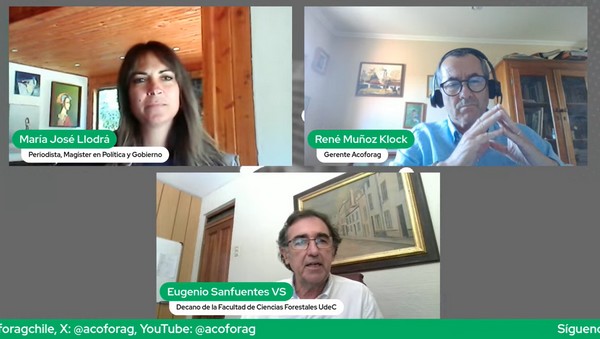As part of the program "Conversando con la Acoforag," the dean of the Faculty of Forest Sciences at the University of Concepción, Eugenio Sanfuentes, addressed the current challenges of the forestry sector and the need for stronger ties between academia, industry, and public institutions.
Sanfuentes acknowledged that while there is some connection between forest science, forest engineering, and natural resources, a trust gap between the university and the productive sector persists. "There has been distrust from both sides—from the industry toward the university and vice versa. We need to improve this relationship," he emphasized.
An Advisory Council for Stronger Connections
The master's and Ph.D. graduate in Phytopathology from the Federal University of Viçosa, Brazil, highlighted the importance of creating an Advisory Council that brings together professionals from the forestry, conservation, and biotechnology sectors to guide academic training and research toward the market's real needs. "Often, we believe we are training the best professionals, but we need feedback from the sector to ensure our graduates truly contribute," he explained.
In this regard, he stressed that external participation in defining undergraduate and graduate programs is key. "In other countries, master's and Ph.D. programs are not just for academia but are integrated into industry and the public sector, driving innovation in productive processes," he noted.
Challenges for the Faculty and the Industry
Currently, the Faculty of Forest Sciences at UdeC offers three undergraduate programs:
📌 Forest Engineering (the oldest)
📌 Plant Biotechnology Engineering (established in 2006)
📌 Natural Resources Conservation Engineering (established in 2010)
Additionally, since 1997, it has offered master's and Ph.D. programs in Forest Sciences, with an enrollment of around 50 graduate students and 500 undergraduate students.
One of the current challenges is the deficit in attracting new students, which has led the faculty to strengthen its outreach strategies. "We know other universities invest heavily in promotional campaigns, so we must be more aggressive in our strategy to attract talent," Sanfuentes admitted.
Stronger Community Engagement
To address these challenges, the faculty recently approved a five-year Strategic Plan prioritizing community engagement. Sanfuentes emphasized that the university must have a stronger presence at the regional, national, and even international levels, strengthening relationships with companies, public institutions, social organizations, and communities.
"The university should not only produce scientific studies but also transfer that knowledge to the productive sector and society at large," he stated. In this sense, he highlighted the importance of participating in dialogue spaces, such as the Semana de la Madera (Wood Week), and fostering discussion and analysis forums that integrate research with the sector's reality.
A Call for Collaboration
The dean called for strengthening the relationship between academia and industry. "We cannot continue operating in isolation; the university has a responsibility toward the development of the forestry and natural resources sector," he concluded.
The challenge is on the table: achieving stronger connections between academia, industry, and public institutions to ensure sustainable and innovative forestry development.
The full interview is available on Acoforag's YouTube channel.







Comentarios (0)
No hay comentarios aún. ¡Sé el primero en comentar!
Deja un comentario